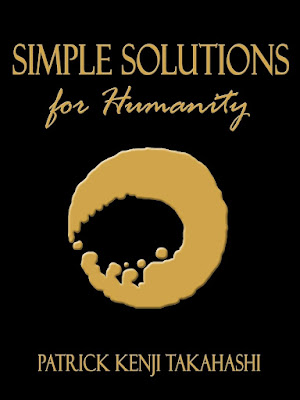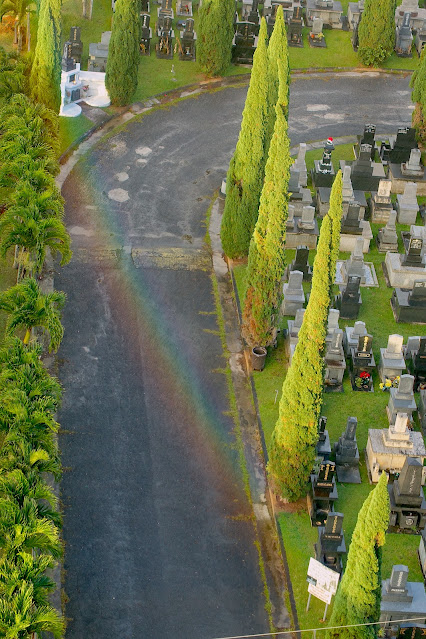 Our journey to Sydney, Australia to catch the Seabourn Odyssey back to Hawaii begins with a Qantas flight. This will be only my second flight on this airline, but my first one was a doozy. Papua New Guinea was the 201st country to visit this blog site. In 2012 I posted on a trip I had nearly a quarter century before that year. This adventure was published in SIMPLE SOLUTIONS for Humanity.
Our journey to Sydney, Australia to catch the Seabourn Odyssey back to Hawaii begins with a Qantas flight. This will be only my second flight on this airline, but my first one was a doozy. Papua New Guinea was the 201st country to visit this blog site. In 2012 I posted on a trip I had nearly a quarter century before that year. This adventure was published in SIMPLE SOLUTIONS for Humanity.
Incidentally, if you haven't read this book, here is the back cover.
Here is partly what the final chapter reported.I traveled to the Independent State of Papua New Guinea (PNG) in 1989, no doubt one of the three most stressful experiences of my life. Most of what follows comes from pure memory, although I do keep files of all my trips, and I did obtain a conference proceedings of why I went there, which was because a professor friend from Michigan convinced me that I should give a talk at his energy conference in PNG, where he had temporarily moved.
The U.S. State Department now has online security information for Americans traveling abroad. This was not available then. Visitors in 2006 were warned, don’t go to PNG. Many incidents of assaults and robbery occur in Port Moresby and Lae, and individuals are especially at high risk. Golf courses, parks and beaches are to be avoided, as are taxis and buses. (Can you believe I was there when it was worse...much worse?) In May 2006, the Australian government was a bit more descriptive, underscoring that there are high levels of serious crime, especially in Lae. PNG is only #12 in murders/capita (U.S. is #24), and is not in the bottom of 10 of worst countries (#148 of 182 countries) according to the United Nations, but it is not a pleasant place to visit. It was particularly dangerous in 1989. A rebellion was running rampant on Bougainville Island and there was a series of no confidence votes against the government.
As I was picking up my suitcase, I noticed a sign saying, “Don’t enter the country if you have not taken Malaria precautions!” My initial reaction was, whoa, go home. But I had to physically proceed through the process to get out, and the customs official asked me about my visa. Aha, I thought, become an arrogant American and let them kick you out. I had a good excuse, for I did not know I needed a visa. At least I could report to the conference sponsors the “I tried” part. I said, “I am an important speaker from the United States and you must let me through even though I don’t have a visa.” He said, “okay,” and I could not think quickly enough to irritate him any further.
After the hour flight to Lae on Air Niugini, I was picked up at the airport by conference planners. Professor S. L. Hall, Head of the Mechanical Engineering Department at the University of Technology from Australia, was on the plane. She casually mentioned that the president of Papua New Guinea University of Technology in Lae was the brother in law of the current head of state, and there was a move to evict him by the opposition party. At the hotel, over drinks, we were told don’t walk around in town, not even in the daytime. And don’t think of doing that at night. There are marauding packs called Rascals, who are mostly cannibals from the jungle who can’t find jobs in town and must rob and kill to stay alive. I thought they were exaggerating, but no one was smiling.
What really caught my attention, though, was when I mentioned that I had not bothered with malaria precautions and asked, “just how serious was it?” One of them dropped his drink and the others, wide-eyed, expressed alarm. First, Lae is a lot wetter than Port Moresby, and the problem is amplified here. Second, it was too late. Third, those trying to prevent malaria as a resident by taking medication can go blind. However, S.L. (don’t remember her first name) gave me a bunch of pills and said, all things concerned, it might help. I asked one of them about the getting blind part and asked for some details. He said he decided not to take that chance, the blind chance. So, he had malaria.
I made one of those command decisions, and this time, to be smart and decisive about it. I remembered that someone in my family was sick with something more serious than a cold and went up to my friend the organizer, F. Welt, and said that I noticed my talk was to be at the banquet two days away. Unfortunately, there was a sickness in the family and I had to leave first thing tomorrow, so could I give my talk today. This was not an outright lie, but close. After some anguishing and discussions, we agreed on my presenting my message at the morning session the next day so I could catch a noon flight to Port Moresby and connect to a Qantas flight to Brisbane. He would be glad to make the adjustments for me. It was difficult for me to disagree with this kind of cooperation. So I was stuck at least a second night.
The next morning, I gave my talk and was rushed to the airport. The plane was late. I was worried about the connecting flight, for if we left at noon, the 1:30 connecting flight time seemed awfully close. The uneasy state of politics was such that this was to be the last plane out of New Guinea that day. I was told that on Fridays (which it was) those who worked get paid, and become drunk and dangerous. Whatever happens, they said, don’t get stranded at the airport.
Finally at 12:30 PM the plane came and immediately left with me. We landed at Jackson at 1:35 and that Qantas plane was still there. I grabbed my luggage and began running to the plane…but was told I first had to go through customs. Well, it took a long time to clear, as first, they wondered about my visa. Finally, finally, I was allowed to board the flight. It turned out the airline was waiting just for me, and till today, I have joyful feelings about Quantas. Brisbane (photo below) is, maybe, among the most boring cities in the world. Those three days there were about the best I spent anywhere in my life. This is part of the reason why Australia is way up there as among the best places to live. However, scratch PNG from the list.One of our stops on this cruise is Brisbane.
As this rather lengthy trip was coming up, with the covid outbreak where I lived, I did not do much, as I was keeping away from residents of 15 Craigside. As I could not take a chance in our wellness center to exercise, I decided to walk in the hallway. My goal on my final day, yesterday, was 10,000 steps. On the 12th floor we have two views of the outside. My walk was illuminated by rainbows.
Note the Moon.Well, I'm at the Honolulu Airport, checked in and made two Bloody Marys in the Qantas Lounge. One hour to boarding.
Next stop, Sydney.
-




















Comments
Post a Comment